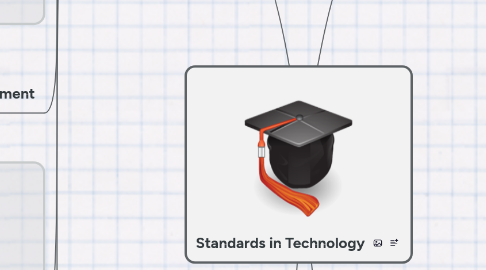
1. Teacher Standards
1.1. Digital Legal and Ethical Issues
1.1.1. Teachers will become informed regarding plagiarism, copyright infringement and trademark misuse
1.1.1.1. http://www.teachingcopyright.org/
1.1.2. Collaborate with IT department to protect student privacy
1.1.2.1. http://www.ftc.gov/kidsprivacy/teachers.htm
1.2. Facilitating and Guiding Student Learning
1.2.1. Teacher will provide support to students when using digital tools
1.2.2. Students should be engaged and actively learning
1.2.3. Keep accurate and up-to-date records
1.3. Develop Opportunities for Digital Learning
1.3.1. Reflect on Classroom Design: Create an atmosphere with flexible seating and open floor space
1.3.2. Access the needs in the classroom to prevent a digital divide among students
1.3.2.1. http://www.ed.gov/news/pressreleases/2003/10/10292003a.html
1.4. Promoting Student Responsibility
1.4.1. Students must be accountable for digital devices and loggins
1.5. Professional Development
1.5.1. Teacher will actively research and improve digital knowledge through professional development opportunities
1.6. Communication and Development
1.6.1. Moderate and encourage communication
1.6.2. Open communication with parents
1.6.3. Create and share a classroom calendar
1.6.3.1. www.teachthought.com/the-future-of-learning/25-teaching-tools-to-organize-innovate-manage-your-classroom/
1.7. Digital Safety and Student Privacy
1.7.1. Use Password-Protected Services
1.7.2. Monitor classroom discussions and conversations
1.7.3. Monitor Visual Content
2. Digital Literacy
2.1. Evaluate and Analyze
2.1.1. Being able to critically judge digital inforamation
2.1.1.1. www.mediasmarts.ca/digital-media-literacy-fundamentals/digital-literacy-fundamentals
2.1.2. Students will explore and present knowledge
2.2. Interpret and Reflect
2.2.1. After publishing work students will give and receive feedback
2.3. Global Awareness
2.3.1. Students will use digital tools to enrich global perspectives
3. Assessments
3.1. District Driven Standards
3.1.1. District will provide quality goals and tools for student learning and assessment
3.1.2. Teacher will be aware of district standars and will adopt and implement assessments as directed
3.2. Classroom Driven Assessments
3.2.1. Assessments are performanced based
3.2.2. Evaluate Results
3.2.3. Teacher will use a variety of assessment tools to reach all learners
3.3. State Driven Standards
3.3.1. Teacher will be aware of state standards and will adopt and implement assessments as directed
3.3.1.1. https://www.k12blueprint.com/news/new-iste-standards-students
4. Student Standards
4.1. Digital Safety and Privacy
4.1.1. Parents and Students will read and sign a "Code of Conduct" form
4.1.2. Parents and students will read and sign an "Acceptable Use Policy"
4.1.3. Provide copy of Children's Online Privacy Protection Act
4.1.3.1. http://www.ftc.gov/ogc/coppa1.htm
4.1.4. Students will recognize the rights and responsibilities when using digital devices
4.1.5. Students will develop digital social awareness and identity
4.2. Communication and Collaboration
4.2.1. Learning should be collaborative
4.2.2. Communication should be respectful
4.2.3. Students will use a variety of platforms to communicate in a digital setting
4.3. Problem Solving and Decision Making
4.3.1. Students will learn how to search for information digitally
4.3.2. Student will make decisions regarding the use of different types of software and digital devices
4.3.3. Students will identify various digital strategies and solutions
4.4. Creativity and Innovation
4.4.1. Students will create and share visual images
4.4.2. Students will organize and manipulate data
4.5. Critical Thinking Skills
4.5.1. Students will use critical thinking skills while investigating and using various digital tools
4.6. Research and Information Fluency
4.6.1. Students will locate and evaluate online sources
4.6.2. Students will develop online search strategies
